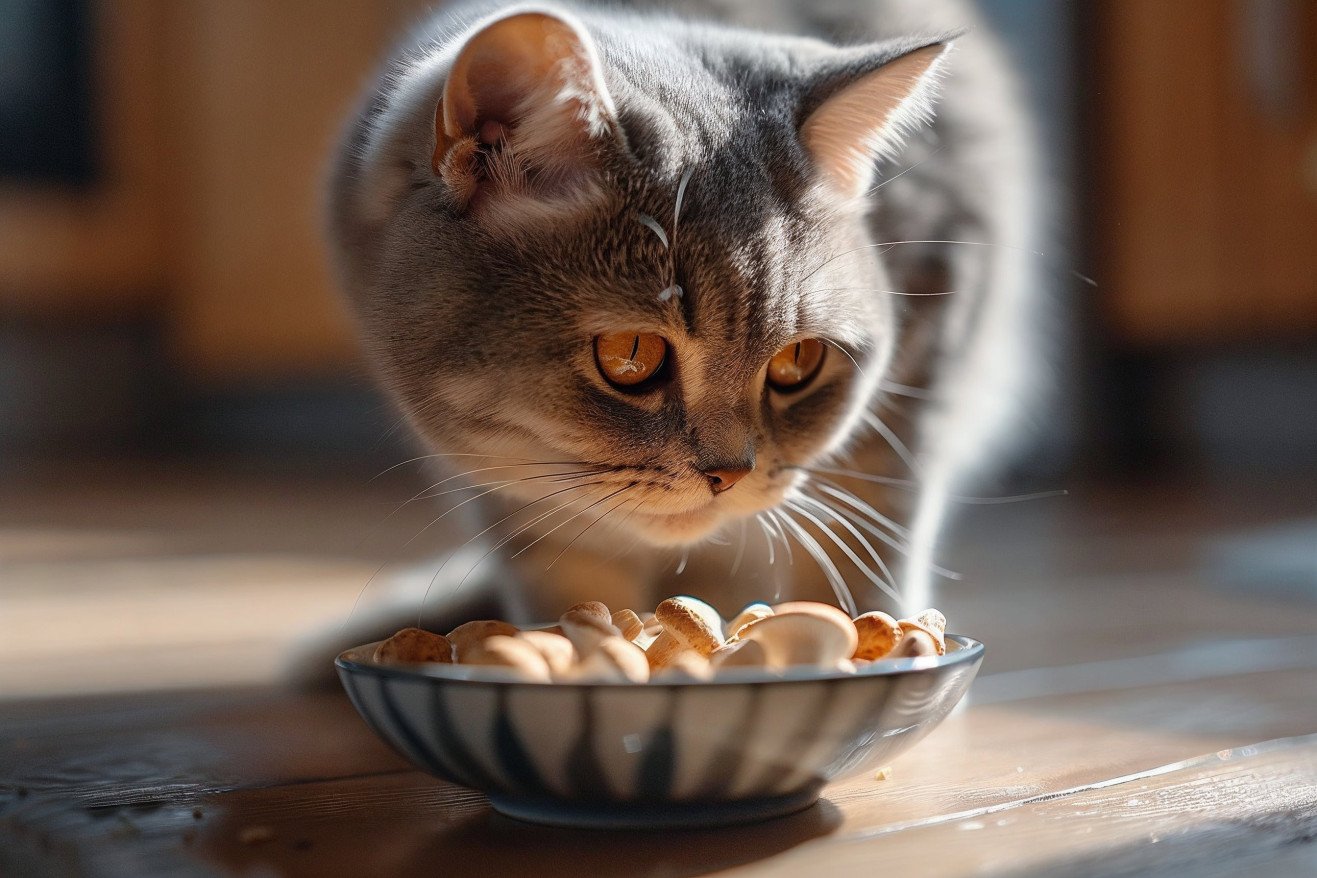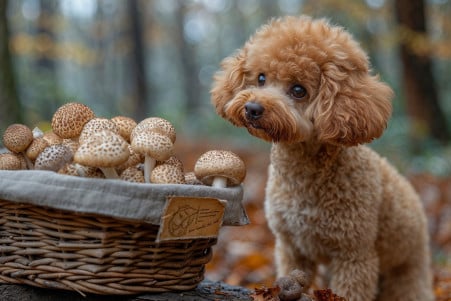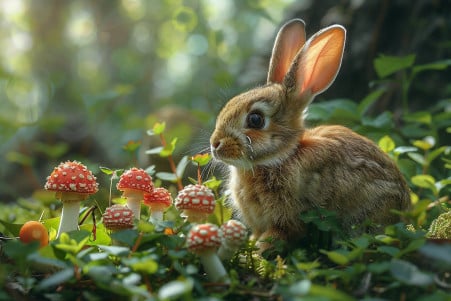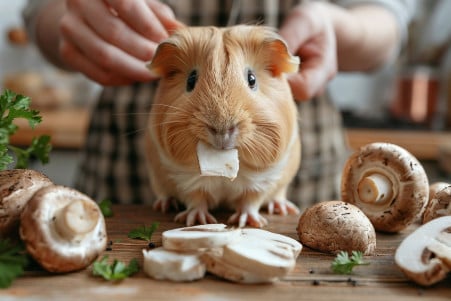Can Cats Eat Mushrooms? What You Need to Know
8 February 2024 • Updated 7 February 2024

While mushrooms are a tasty treat for people, are they something that can be dangerous or helpful for cats? Some mushrooms that you can buy at the store are safe for cats to eat in small amounts, including cooked plain white, button, or portobello mushrooms. That said, many wild mushrooms are poisonous to cats and can lead to a number of health problems. As a result, it’s probably best to avoid giving cats mushrooms.
This article will take a deep dive into a wide range of veterinary and nutritional research to help shed light on the nuances of feline nutrition and the safety of mushrooms. You’ll not only find out where the science currently stands on the question of whether mushrooms are a good food for cats but also what the potential risks are.
By exploring the most recent research in pet food safety and toxicology, we hope to give you the information you need to make the best choices for your cat’s diet.
Can cats eat mushrooms?
The Danger Within: Mushroom Poisoning in Cats
Although many mushrooms are harmless, cat parents need to watch out for the types of mushrooms that can lead to serious health problems in their pets. More than 100 species of mushrooms in North America, including Amanita, Galerina, and Lepiota, are toxic to cats, according to the Pet Poison Helpline. Mushroom poisoning can result in everything from gastrointestinal upset to liver and kidney failure, neurological issues, and even death.
If you think your cat has eaten a poisonous mushroom, it’s important to act fast. According to the Merck Veterinary Manual, symptoms can occur anywhere from minutes to 24 hours after ingestion, depending on the type and amount of mushroom consumed.
In these cases, it’s important to call your vet and the Pet Poison Helpline at (855) 764-7661. Bringing a sample of the mushroom to the vet can help them identify and treat the poisoning.
The problem is that it can be hard to identify mushrooms, especially since the difference between toxic and non-toxic mushrooms can be hard to see. Since treatment for mushroom poisoning is often supportive and involves decontamination rather than an antidote, the best way to keep your cat safe is to prevent exposure. This means making sure your cat can’t get to mushrooms, especially when they’re outside.
Feline Nutrition and Mushrooms
Cats are obligate carnivores, meaning that they have specific dietary requirements that can only be met with nutrients from animal sources. According to the Cornell University College of Veterinary Medicine, cats need a diet that is high in protein and contains the right amino acids, as well as essential vitamins and fatty acids. Because of this need for animal-based nutrition, it’s important to look at the potential benefits of mushrooms for cats.
While mushrooms have been shown to have health benefits in people and may help boost the immune system in pets according to Fera Pet Organics, it’s unclear what role mushrooms play in a cat’s diet. While mushrooms do contain vitamins and minerals, the essential nutrients that cats need are already provided in the right amounts in properly formulated commercial cat foods, which follow the guidelines of the Association of American Feed Control Officials.
Because of cats’ specific nutritional needs, there’s no need to include mushrooms in their diet, and most commercial cat foods don’t include them. Cats are best able to get the high protein they need from animal tissues, which also provide the amino acid profile that cats need. So while mushrooms may provide some nutrients, they don’t provide the essential nutrients that cats need and aren’t part of a balanced feline diet.
The Feline Digestive System: Can Cats Digest Mushrooms?
Cats are obligate carnivores, meaning their digestive systems are designed to efficiently process animal-based proteins. A breakdown by Washington State University of the feline digestive system shows that cats have organs like a simple stomach and short intestines that are made for digesting meat. This biological layout means that plant-based foods like mushrooms may be harder to digest and could cause gastrointestinal issues.
The way that cats digest the animal-based proteins in their typical diet is very different from how they would digest the plant-based proteins in mushrooms. Mushrooms have chitin, a complex carbohydrate that cats’ digestive enzymes can’t easily break down. This could lead to gastrointestinal upset or even more serious issues like obstruction or inflammatory bowel disease (IBD), according to the Merck Veterinary Manual.
In general, veterinarians advise against feeding cats non-traditional foods because of the potential for problems and the fact that they don’t meet cats’ nutritional needs.
While some cats may be interested in mushrooms, their natural hunting instincts would lead them to seek out their ancestral diet, which is high in meat and protein. Because of the potential issues and the fact that there’s no reason to feed cats mushrooms, it’s best for cat owners to keep mushrooms out of their cats’ diets.
Hunting and Mushroom Foraging
The hunting and foraging behaviors of cats, which are driven by their predatory instincts and the need to find food in the wild, are still present in domestic cats, even when they are well-fed by their human caregivers, according to International Cat Care.
These behaviors are based on the cats’ ancestral need to eat small, frequent meals throughout the day. Although domestic cats have been able to adapt to living with humans, their desire to hunt has remained, which could lead them to come across mushrooms while they’re out and about.
In addition, as noted in "Taste preferences and diet palatability in cats" by Serkan Baris Mlazmolu, cats are neophilic, meaning they are attracted to new foods, including mushrooms. However, this attraction may not lead to consumption, especially if the mushrooms don’t meet their specific taste and texture preferences. Because cats are obligate carnivores, mushrooms are unlikely to be appealing to them based on their natural preferences.
Owners can help keep their cats safe by monitoring their outdoor time and limiting their access to areas where poisonous mushrooms may be growing. By recognizing and meeting their cats’ behavioral and dietary requirements, owners can also help prevent their cats from eating mushrooms. As recommended by PMC, providing cats with food puzzles can help satisfy their foraging instincts and direct them to safe, appropriate food sources in the home.
What to Do If Your Cat Eats a Poisonous Mushroom
If you suspect your cat has eaten a toxic mushroom, it’s important to act quickly to ensure the best possible outcome. The Merck Veterinary Manual advises that you start by removing any remaining mushroom from your cat’s mouth and then monitor them for signs of poisoning, including vomiting, diarrhea, and lethargy. That said, you should not try to induce vomiting at home as it can lead to further complications. Instead, seek immediate medical attention.
When you get to the vet, they will perform a physical exam and may administer decontamination treatments, such as activated charcoal, to help prevent your cat from absorbing more of the toxin, according to Today’s Veterinary Nurse. The Merck Veterinary Manual notes that general treatment for poisoning can also involve supportive care, including things like managing seizures and ensuring that your cat can breathe.
For professional help and advice, the Pet Poison Helpline (855-764-7661) and the ASPCA Animal Poison Control Center both provide immediate poison control assistance. You can get important information from these hotlines while you’re on your way to the vet.
Knowing that time is of the essence and who to call can be the difference between life and death in these situations. Once your cat is safe, you can focus on preventing future incidents and educating others about the risks that mushrooms can pose to cats.
Final Thoughts: Protecting Your Cat from Mushroom Dangers
While this article has shown that cats can eat certain store-bought mushrooms like white, button, or portobello in small amounts, it is important to remember the dangers of mushrooms, especially wild mushrooms. With more than 100 toxic mushroom species in North America, including Amanita, Galerina, and Lepiota, the potential for serious health problems, including gastrointestinal upset, liver and kidney failure, and neurological symptoms, is real.
Mushrooms are not necessary for cats’ diets and can even cause digestive upset due to cats’ unique nutritional needs and digestive systems. As noted by cats.com and the Pet Poison Helpline, the fact that cats are attracted to the umami taste of mushrooms does not mean that mushrooms are good for them, and cats’ natural foraging behavior can lead to accidental poisoning.
In conclusion, we do not recommend feeding mushrooms to cats and suggest that cat owners talk to their vets about the best diet for their individual pets. It is important to prioritize the health and safety of our feline friends, making sure that their natural curiosity does not lead to dietary hazards.


